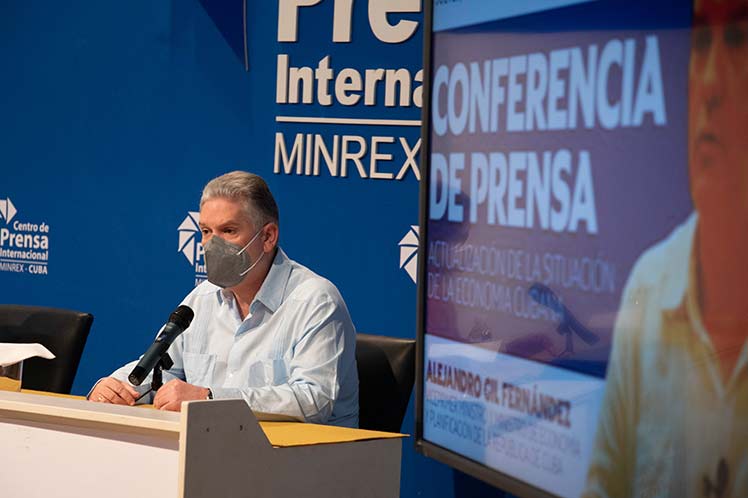Havana, Cuba: The complex scenario of the Cuban economy today has an enormous challenge in inflationary processes, particularly due to its negative impact on the population and the repercussions on the social panorama, Prensa Latina publishes.
The confrontation with this phenomenon that makes the lives of Cubans more expensive, also linked to care for vulnerable people, is another of the priorities for the country’s leadership, the Deputy Prime Minister and Minister of Economy and Planning, Alejandro Gil, said.
It is a complex issue that does not have a single solution, Gil insisted at a press conference this Thursday, adding that all possible alternatives that do not have a neoliberal cut are being studied, to which scholars of economics and the academia contribute.
However, he emphasized that without increasing the supply it is not possible to aspire to an effective control of the inflationary processes, which in the Cuban context, with the scourge of Covid-19, the economic blockade and the more than 240 unilateral measures of the United States squeezing the throat of the Caribbean nation, is a challenge.
Despite this, the island is currently going through a gradual process of economic recovery and aspires to conclude the year with a growth in gross domestic product (GDP) of around two percent, said the deputy prime minister himself.
He warned, however, that it will take time to return to the activity levels of 2019, as it is about to overcome the contraction of 10.9 percent experienced in 2020.
Inflation is, for the population, the most visible face of this fall, as they have to pay in the illegal market up to seven times the value of basic necessities such as food, due to insufficient supply in the formal market.
Added to this is the impact of the monetary ordering process that began on January 1, 2021, which implied the devaluation of the Cuban peso against the dollar (1 for 24), the increase in prices and purchasing power, by also increasing wages and pensions.
All of this means that for the moment the economic authorities cannot specify the amount of inflation.
Gil explained that although it is possible to compare the official prices of 2021 against those of 2020, that calculation would show only part of the reality, which includes the impact of the devaluation of the currency, but it cannot be avoided that many people do not purchase the products. in the established market, but in the illegal one.
“There is no doubt that inflation is strong,” according to the Minister of Economy, but he affirmed that it is an objective of the country’s policy to face it without resorting to neoliberal solutions.
Regarding the ways for this, he mentioned the elimination of tariffs on food and medicine imports, as well as for supplies brought from abroad by non-state management; a fiscal sacrifice that seeks to avoid the transfer of these costs to the final prices.
Similarly, garage sales were authorized, around 60 brokerage houses were opened in the country and the obstacles that existed for the commercialization of idle inventories were removed, all of which contributes to increasing offers.
The deputy prime minister gave an important role to increasing agricultural production and referred to the control of liquidity in the hands of the population; but he meant that fiscal, monetary, and other administrative measures will only have a limited effect.
“As long as there is a shortage of supply and people who are dedicated to reselling, if there is a demand for the ability to acquire these products at the prices they have in the market today, inflationary processes will continue,” he said.
The value of currencies in the underground economy also impacts on this phenomenon, since having them implies access to products in freely convertible currency; however, Gil explained, the country is not in a position to sell them and combat their illegal exchange.
He added that social responsibility and ethics also count in confronting the problem, because in a country like Cuba, which does not charge for health services, education and other benefits, the excessive increase in prices is ethically unsustainable.
“We have to call on all the actors to understand the situation and not take advantage of the needs of the people,” he said.

Redacción Digital
Equipo de redactores del sitio web de Radio Mayabeque



